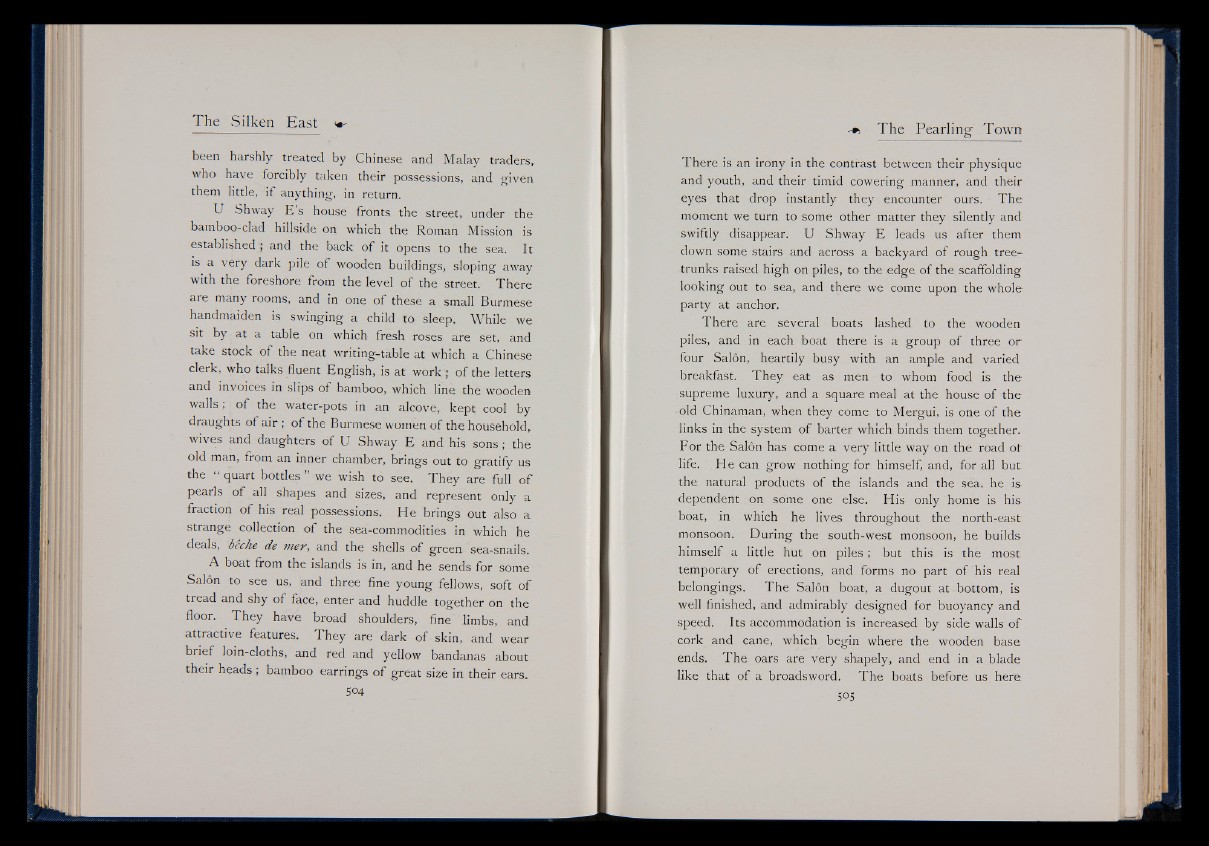
been harshly treated by Chinese and Malay traders,
who have forcibly taken their possessions, and given
them little, if anything, in return.
U Shway E s house fronts the street, under the
bamboo-clad hillside on which the Roman Mission is
established; and the back of it opens to the sea. It
is a very dark pile of wooden buildings, sloping away
with the foreshore from the level of the street. There
are many rooms, and in one of these a small Burmese
handmaiden is swinging a child to sleep, While we
sit by at a table on which fresh roses are set, and
take stock of the neat writing-table at which a Chinese
clerk, who talks fluent English, is at work'; of the letters
and invoices in slips of bamboo, which line the wooden
walls; j of the water-pots in an alcove, kept cool by
draughts of air ; of the Burmese women of the household,
wives and daughters of U Shway E and his sons; the
old man, from an inner chamber, brings out to gratify us
the quart bottles we wish to see. They are full of
pearls of all shapes and sizes, and represent only a
fraction of his real possessions. He brings out also a
strange collection of the sea-commodities in which he
deals, bee he de tucv, and the shells of green sea-snails.
A boat from the islands is in, and he sends for some
Sal6n to see us, ,and three fine young fellows, soft of
tread and shy of face, enter and huddle together on the
floor. They have broad shoulders, fine limbs, and
attractive features. They are dark of skin, and wear
brief loin-cloths, and red and yellow bandanas about
their heads ; bamboo earrings of great size in their ears.
504
There is an irony in the contrast between their physique
and youth, and their timid cowering manner, and their
eyes that drop instantly they encounter ours. The
moment we turn to some other matter they silently and
swiftly disappear. U Shway E leads us after them
down some stairs and across a backyard of rough tree-
trunks raised high on piles, to the edge of the scaffolding
looking out to sea, and there we come upon the whole
party at anchor.
There are several boats lashed to the wooden
piles, and in each boat there is a group of three or
four Salón, heartily busy with an ample and varied
breakfast. They eat as men to whom food is the
supreme luxury, and a square meal at the house of the
old Chinaman, when they come to Mergui, is one of the
links in the system of barter which binds them together.
For the Salón has come a very little way on the road ot
life. He can grow nothing for himself, and, for all but
the natural products of the islands and the sea, he is-
dependent on some one else. His only home is his
boat, in which he lives throughout the north-east
monsoon. During the south-west monsoon, he builds
himself a little hut on piles ; but this is the most
temporary of erections, and forms no part of his real
belongings. The Salón boat, a dugout at-bottom, is
well finished, and admirably designed for buoyancy and
speed. Its accommodation is increased by side walls o f
cork and cane, which begin where the wooden base
ends. The oars are very shapely, and end in a blade
like that of a broadsword. The boats before us here
SOS